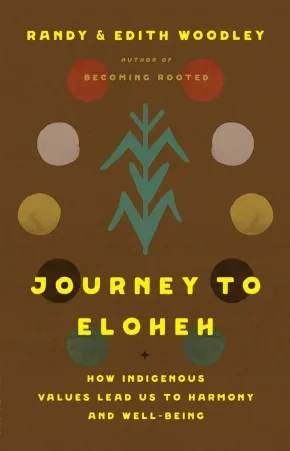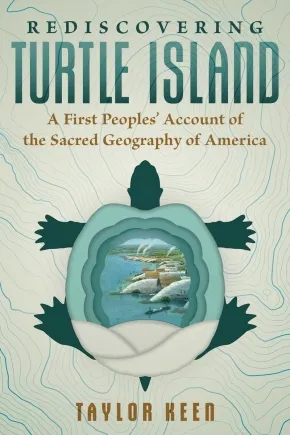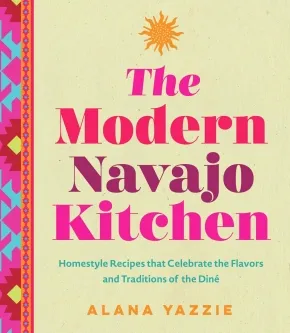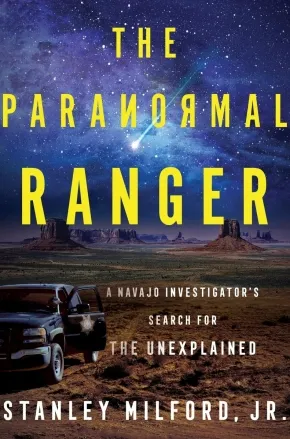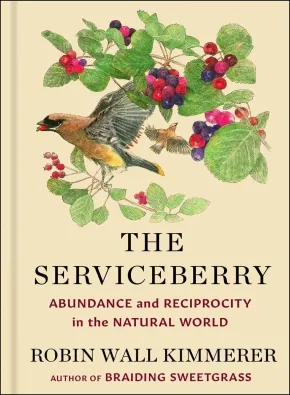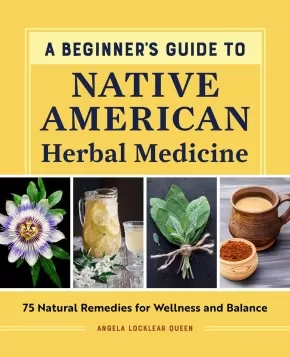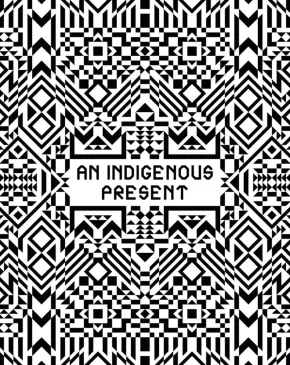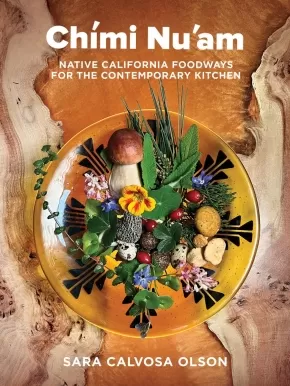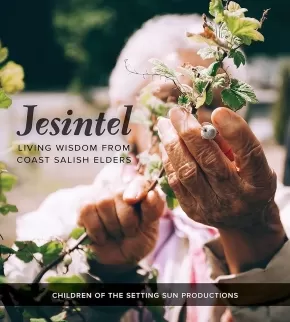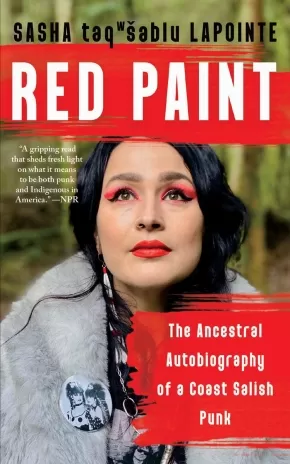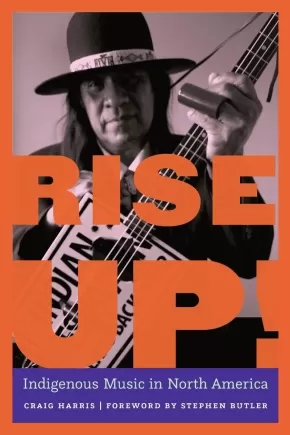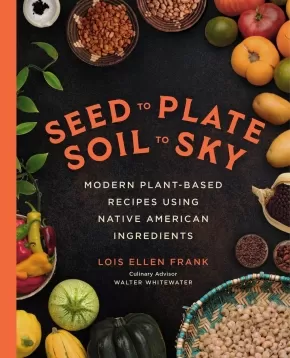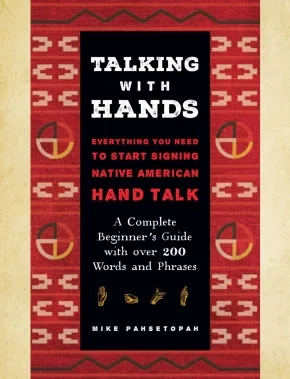
Indigenous Peoples in the United States
16
-
30
of
80 Results;
Sort By
Go To
of 6
Journey to Eloheh: How Indigenous Values Lead Us to Harmony and Well-Being
$37.99
Format:
Hardcover
Text Content Territories:
Indigenous American; Native American; Shoshone; Eastern Shoshone Tribe; Cherokee; United Keetoowah Band ;
ISBN / Barcode: 9781506496979
Synopsis:
Synopsis:
Rooted in ten Indigenous values, this thoughtful, holistic book-written by Randy Woodley, a Cherokee descendant recognized by the Keetoowah Band, and Edith Woodley, an Eastern Shoshone tribal member-helps readers learn lifeways that lead to true wholeness, well-being, justice, and harmony.
The pursuit of happiness, as defined by settlers and enshrined in the American Dream, has brought us to the brink: emotionally, spiritually, socially, and as a species. We stand on a precipice, the future unknown. But Indigenous people carry forward the values that humans need to survive and thrive. In Journey to Eloheh, Randy and Edith Woodley help readers transform their worldviews and lifestyles by learning the ten values of the Harmony Way. These ten values, held in common across at least forty-five Indigenous tribes and nations, can lead us toward true well-being: harmony, respect, accountability, history, humor, authenticity, equality, friendship, generosity, and balance. By learning, converting to, and cultivating everyday practices of Eloheh--a Cherokee word meaning harmony and peace--we have a chance at building well-being and a sustainable culture.
In this riveting account of their own journeys toward deepening their indigeneity and embodying harmony, Edith, an activist-farmer, and Randy, a scholar, author, teacher, and wisdom-keeper, help readers learn the lifeways of the Harmony Way. The journey to Eloheh holds promise for all of us, Indigenous or not.
We know the Western worldview is at odds with a sustainable Earth, a just common life, and personal well-being. Together we can convert to another way of living--one that recognizes the Earth as sacred, sees all creation as related, and offers ancestral values as the way forward to a shared future.
Reviews
"Edith and Randy Woodley's passion and persistence to create spaces of community and care are inspiring. A blend of storytelling, theology, and guidance harvested directly through Indigenous wisdom, Journey to Eloheh reminds us to stay true to the path of kinship and belonging, and to never give up on justice and peacemaking in the world. I highly recommend this book for anyone who is searching for a way to be a better relative on this earth or to fight for a better reality for future generations. This book will help you get there." --Kaitlin B. Curtice, award-winning author of Native and Living Resistance
"Spiritual journey as autobiography: like a Navajo weaver, Journey to Eloheh skillfully connects Native American theology and personal experience into a way of life. If you are looking for your own path, Edith and Randy Woodley's story is a good place to begin." --Steven Charleston, author of Ladder to the Light, Spirit Wheel, and We Survived the End of the World
"There is so much we can all learn from the wisdom of Indigenous culture. In this book, Randy and Edith Woodley invite us to join them on a journey of learning a different way of living that leads to wholeness, abundance, and peace. They generously share their life experience and spiritual insights to show us a better path toward harmony with the whole of creation. I highly recommend it!" --Dr. Brenda Salter McNeil, author of Becoming Brave and Roadmap to Reconciliation 2.0
"A practical antidote to despair, hopelessness, and aimless consumption, this book offers a robust and healing path to well-being for all of us. The Woodleys are wise and trustworthy guides for restoration and embodied goodness within the community of creation." --Sarah Bessey, author of Field Notes for the Wilderness: Practices for an Evolving Faith
"Randy and Edith Woodley write with insight and wisdom from their years of experience. They have prophetic voices that draw attention to the needs of all of our relatives. Their voices rise out of difficult situations in which they have done more than survive; they are showing how to flourish in an ever-changing world." --Ray Aldred, director of the Indigenous Studies Program, Vancouver School of Theology
"For many years, I have considered Randy Woodley one of my teachers. His books, lectures, and personal conversations--together with his humble, yet bold, spirit as a teacher--have enriched and challenged me. His new book, co-written with his wise and eloquent wife, Edith, is a masterpiece, a book I would recommend to anyone and everyone. It beautifully combines the sharing of their life-story with the essence of their lifeway, articulated in ten powerful Indigenous values that are as deeply spiritual as they are deeply practical." --Brian McLaren, author, teacher, and activist
Educator Information
Keywords / Themes: Well-Being; the Harmony Way (Eloheh); Ten Eloheh Values; Indigenous Knowledge, Indigenous Values; Personal Growth.
Additional Information
264 pages | 5.75" x 8.75" | Hardcover
Rediscovering Turtle Island: A First Peoples' Account of the Sacred Geography of America
$24.99
Format:
Paperback
Text Content Territories:
Indigenous American; Native American; Ponca; Osage; Omaha; Kaw; Cherokee; Anishinaabeg; Algonquin; Sioux;
Reading Level: N/A
ISBN / Barcode: 9781591435204
Synopsis:
Synopsis:
An exploration of Indigenous cosmology and history in North America
• Examines the complexities of Indigenous legends and creation myths and reveals common oral traditions across much of North America
• Explores the history of Cahokia, the Mississippian Mound Builder Empire of 1050-1300 CE, told through the voice of Honga, a Native leader of the time
• Presents an Indigenous revisionist history regarding Thomas Jefferson, expansionist doctrine, and Manifest Destiny
While Western accounts of North American history traditionally start with European colonization, Indigenous histories of North America—or Turtle Island—stretch back millennia. Drawing on comparative analysis, firsthand Indigenous accounts, extensive historical writings, and his own experience, Omaha Tribal member, Cherokee citizen, and teacher Taylor Keen presents a comprehensive re-imagining of the ancient and more recent history of this continent’s oldest cultures. Keen reveals shared oral traditions across much of North America, including among the Algonquin, Athabascan, Sioux, Omaha, Ponca, Osage, Quapaw, and Kaw tribes. He explores the history of Cahokia, the Mississippian Mound Builder Empire of 1050–1300 CE. And he examines ancient earthen works and ceremonial sites of Turtle Island, revealing the Indigenous cosmology, sacred mathematics, and archaeoastronomy encoded in these places that artfully blend the movements of the sun, moon, and stars into the physical landscape.
Challenging the mainstream historical consensus, Keen presents an Indigenous revisionist history regarding Thomas Jefferson, expansionist doctrine, and Manifest Destiny. He reveals how, despite being displaced as the United States colonized westward, the Native peoples maintained their vision of an intrinsically shared humanity and the environmental responsibility found at the core of Indigenous mythology.
Building off a deep personal connection to the history and mythology of the First Peoples of the Americas, Taylor Keen gives renewed voice to the cultures of Turtle Island, revealing an alternative vision of the significance of our past and future presence here.
Reviews
“Brother Keen, with his infinite Indigenous and academic knowledge, brings forth amazing truths about ancient North American cultures the modern world was unaware of. Not only are the ancient earthworks extensive and scientifically and astronomically complex but Keen unveils they are all connected across the entire continent, mirroring the heavens. Simply incredible research.” — Scott Wolter, host of History 2 (H2) Channel’s America Unearthed, world-renowned forensic geol
“Careful analysis by Taylor Keen of the placement and designs of earthworks of the Indigenous people of North America reveals far more complex planning and design was involved than just random location selection of mounds for burials, as we were taught to think. His geographical analysis reveals the sacred earthworks designs were far more advanced and esoteric in nature, something he is uniquely qualified to understand as Indigenous himself and a member of several esoteric orders. He proves definitively the intricate level of knowledge of astronomy, heavenly body movements, mathematics, and cosmology involved in the creation of these earthworks, not only at a local level, but incredibly as long-range alignments as well. This revelation, Keen explains, was something that was dismissed and suppressed by early nineteenth-century archaeologists who breached and destroyed the sacred earthworks and burial mounds as part of the promotion of ‘manifest destiny,’ with the intent being justification of taking tribal lands for settlement. Keen’s incredibly important work gives a whole new perspective on the history of North America.” — Janet Wolter, coauthor of America: Nation of the Goddess
“The official history of the United States begins with Spanish contact in the late fifteenth century. The oral traditions and legends of the various Native peoples of North America, however, stretch back much earlier, into the opaque mists of preliterate times. With a member of the Earthen Bison Clan of the Omaha Tribe to serve as our guide, Rediscovering Turtle Island leads the reader along near-forgotten, overgrown paths that twist and turn throughout a resacralized landscape, decorated with ancient landmarks, populated with whispering ghosts and supernatural beings. The sacred geography of America will never again appear the same.” — P. D. Newman, author of Native American Shamanism and the Afterlife Journey in the Mississippi Valle
“What could be more fascinating than the origin of mankind itself? The premise is staggering and the consequences far-reaching. Keen’s hard work pays off immensely in Rediscovering Turtle Island, and readers will be gripped by that experience on every page.” — Sidian M.S. Jones, coauthor of The Voice of Rolling Thunder
Additional Information
208 pages | 6.00" x 9.00" | 70 b&w illustrations | Paperback
Roxanne Dunbar-Ortiz's Indigenous Peoples' History of the United States: A Graphic Interpretation
$29.95
Artists:
Editors:
Format:
Hardcover
Text Content Territories:
Indigenous American;
Reading Level: N/A
ISBN / Barcode: 9780807012680
Synopsis:
Synopsis:
In stunning full color and accessible text, a graphic adaptation of the American Book Award winning history of the United States as told from the perspective of Indigenous peoples—perfect for readers of all ages
Roxanne Dunbar-Ortiz’s influential New York Times bestseller exposed the brutality of this nation’s founding and its legacy of settler-colonialism and genocide. Through evocative full color artwork, renowned cartoonist Paul Peart-Smith brings this watershed book to life, centering the perspective of the peoples displaced by Europeans and their white descendants to trace Indigenous perseverance over four centuries against policies intended to obliterate them.
Recognized for his adaptation of W.E.B. DuBois’ The Souls of Black Folk and his extensive expertise in the comics industry, Peart-Smith collaborates with experienced graphic novel editor Paul Buhle to provide an accessible introduction to a complex history that will attract new generations of readers of all ages. This striking graphic adaptation will rekindle crucial conversations about the centuries-long genocidal program of the US settler-colonial regime that has largely been omitted from history.
Reviews
“Adapting a work of history as dense and as vital as Dunbar-Ortiz’s An Indigenous Peoples’ History of the United States (2014) to comics form is no easy feat, but Peart-Smith is up for the task . . . A thoughtful, radically hopeful work that is sure to resonate with readers of all ages.” - Booklist
Educator Information
The publisher does not provide a recommended age range, but notes in the description that this graphic interpretation "will attract new generations of readers of all ages".
Table of Contents
Additional Information
120 pages | 8.22" x 10.28" | Hardcover
The Modern Navajo Kitchen: Homestyle Recipes that Celebrate the Flavors and Traditions of the Diné
$32.99
Format:
Hardcover
Text Content Territories:
Indigenous American; Native American; Navajo (Diné);
Reading Level: N/A
ISBN / Barcode: 9781577154679
Synopsis:
Synopsis:
Nourish your body and mind through food with these 60 recipes celebrating Navajo culinary traditions.
The Modern Navajo Kitchen takes you on an exhilarating journey for your taste buds. This beautifully photographed cookbook ties together traditional Navajo recipes as well as global recipes with a Navajo spin, creating a truly unique culinary experience! Choose from a plethora of drinks, breads, breakfasts, soups, mains, sides, and desserts—the sky’s the limit.
Incorporating traditional and modern ingredients, some of the deliciously nourishing and comforting recipes include:
- Navajo Boba Milk Tea (Abe’ Boba Dééhk’azí)
- Fry Bread (Dah Díníilghaazh)
- Navajo Burgers (Atsį’ Yik’ą́ Náneeskadí Bił Ałch’į’ Át’éhí)
- Sumac and Strawberry Greek Yogurt Ice Pops (Chiiłchin Yogurt Tiní)
- and more!
This comprehensive cookbook also includes instructions for how to make such things as juniper ash, roasted cornmeal, and roasted chiles that will bring your Navajo cooking skills to the next level. A short history of Navajo culinary traditions is provided to provide cultural context behind your new culinary experiences, and sample meal plans will help you put together the perfect menus for the week ahead or for those special occasions with family and friends.
Reconnect to your cultural heritage or treat your palate (or both!) with The Modern Navajo Kitchen.
Additional Information
192 pages | 8.00" x 9.50" | Colour Photos | Hardcover
The Paranormal Ranger: A Navajo Investigator's Search for the Unexplained (HC) (5 in Stock)
$35.99
Format:
Hardcover
Text Content Territories:
Indigenous American; Native American; Cherokee; Navajo (Diné);
Reading Level: N/A
ISBN / Barcode: 9780063371057
Synopsis:
Synopsis:
A Navajo Ranger’s chilling and clear-eyed memoir of his investigations into bizarre cases of the paranormal and unexplained in Navajoland
As a Native American with parents of both Navajo and Cherokee descent, Stanley Milford Jr. grew up in a world where the supernatural was both expected and taboo, where shapeshifters roamed, witchcraft was a thing to be feared, and children were taught not to whistle at night.
In his youth, Milford never went looking for the paranormal, but it always seemed to find him. When he joined the fabled Navajo Rangers—a law enforcement branch of the Navajo Nation who are equal parts police officers, archeological conservationists, and historians—the paranormal became part of his job. Alongside addressing the mundane duties of overseeing the massive 27,000-square-mile reservation, Milford was assigned to utterly bizarre and shockingly frequent cases involving mysterious livestock mutilations, skinwalker and Bigfoot sightings, UFOs, and malicious hauntings.
In The Paranormal Ranger, Milford recounts the stories of these cases from the clinical and deductive perspective of a law enforcement officer. Milford’s Native American worldview and investigative training collide to provide an eerie account of what logic dictates should not be possible.
Reviews
“Stanley Milford Jr. masterfully intertwines memoir, Diné creation stories, and true encounters with otherworldly phenomena. As a Navajo Ranger, Milford’s path is shadowed by eerie cryptids, mysterious UFOs, and the ever-present trials of his demanding role. His unwavering dedication, bravery, and deep cultural insight transform this narrative into a mesmerizing journey. Bridging the realms of legend and reality, each spine-chilling investigation illuminates the enduring spirit and wisdom of the Navajo people, offering readers a profound and unforgettable cultural experience.”— Shane Hawk, co-editor of Never Whistle at Night: An Indigenous Dark Fiction Anthology
“Stan’s life story is a true testament to the reverence that Native American culture has for the paranormal. His passion for investigating the otherworldly really shines. A fascinating read, and highly recommended!” — Steve Gonsalves, star of Ghost Hunters and bestselling author of A Life with Ghosts
“Many of Stan’s experiences recounted in this book parallel what we’ve seen on Skinwalker Ranch, with an eerie degree of similarity. Getting to learn more about Stan’s life and his Navajo-Cherokee heritage alongside these incredible stories is a meaningful bonus.” — Jim Morse, ranch manager and cast member of The Secret of Skinwalker Ranch
"Milford interweaves colorful stories from Navajo mythology that illuminate cultural beliefs about the origins of life, monsters, and the spirit world. . . . Engaging reading for adventurous minds." — Kirkus Reviews
"Equal parts memoir and supernatural record, Milford's book shares how these occurrences enlightened him. He leaves the reader with a unified theory of how paranormal phenomena are connected and what this means for us as human beings. And he demonstrates how experience and open-mindedness can, over a lifetime, build up to unparalleled expertise." — Booklist
Additional Information
256 pages | 6.00" x 9.00" | Hardcover
The Serviceberry: Abundance and Reciprocity in the Natural World
$25.00
Format:
Hardcover
Text Content Territories:
Indigenous American;
ISBN / Barcode: 9781668072240
Synopsis:
Synopsis:
From the #1 New York Times bestselling author of Braiding Sweetgrass, a bold and inspiring vision for how to orient our lives around gratitude, reciprocity, and community, based on the lessons of the natural world.
As Indigenous scientist and author of Braiding Sweetgrass Robin Wall Kimmerer harvests serviceberries alongside the birds, she considers the ethic of reciprocity that lies at the heart of the gift economy. How, she asks, can we learn from Indigenous wisdom and the plant world to reimagine what we value most? Our economy is rooted in scarcity, competition, and the hoarding of resources, and we have surrendered our values to a system that actively harms what we love. Meanwhile, the serviceberry’s relationship with the natural world is an embodiment of reciprocity, interconnectedness, and gratitude. The tree distributes its wealth—its abundance of sweet, juicy berries—to meet the needs of its natural community. And this distribution insures its own survival. As Kimmerer explains, “Serviceberries show us another model, one based upon reciprocity, where wealth comes from the quality of your relationships, not from the illusion of self-sufficiency.”
As Elizabeth Gilbert writes, Robin Wall Kimmerer is “a great teacher, and her words are a hymn of love to the world.” The Serviceberry is an antidote to the broken relationships and misguided goals of our times, and a reminder that “hoarding won’t save us, all flourishing is mutual.”
Reviews
“Robin Wall Kimmerer is writer of rare grace. She writes about the natural world from a place of such abundant passion that one can never quite see the world the same way after having seen it through Kimmerer’s eyes. In Braiding Sweetgrass, she takes us on a journey that is every bit as mythic as it is scientific, as sacred as it is historical, as clever as it is wise. She is a great teacher, and her words are a hymn of love to the world.” —Elizabeth Gilbert
“Robin Wall Kimmerer has written an extraordinary book, showing how the factual, objective approach of science can be enriched by the ancient knowledge of the indigenous people. It is the way she captures beauty that I love the most—the images of giant cedars and wild strawberries, a forest in the rain and a meadow of fragrant sweetgrass will stay with you long after you read the last page.” —Jane Goodall
“I give daily thanks for Robin Wall Kimmerer for being a font of endless knowledge, both mental and spiritual.”—Richard Powers, The New York Times
“Robin Wall Kimmerer opens a sense of wonder and humility for the intelligence in all kinds of life we are used to naming and imagining as inanimate.” —Krista Tippett, host of On Being
Additional Information
112 pages | 5.00" x 7.00" | Hardcover
A Beginner's Guide to Native American Herbal Medicine: 75 Natural Remedies for Wellness and Balance
$25.99
Format:
Paperback
Text Content Territories:
Indigenous American; Native American;
Reading Level: N/A
ISBN / Barcode: 9798886501278
Synopsis:
Synopsis:
Improve your well-being with Native American herbal medicine
Native American herbal medicine offers a powerful way to connect with the earth and heal naturally—and with this handbook of Native American herbs, you can learn all about herb uses and their restorative effects. Written by an Indigenous herbalist, this guide shows you how to responsibly use traditional plants to treat anxiety, colds, inflammation, and more.
This standout among books about herbs and healing will help you:
- Learn about a time-honored practice—Discover the origins and healing secrets of Native American herbalism, its traditional and modern uses, and how tools like the medicine wheel teach us about our relationship with the natural world.
- Identify the essential herbs—Explore the healing properties of medicinal herbs for wellness, from anise hyssop to yerba santa.
- Make 75 natural remedies—Ease physical and emotional ailments with Native American remedies, like Memory Support Tea, Stress-Induced Headache Tincture, and Antibacterial Healing Herb Liniment.
Tap into traditional wisdom with this Native American herbal medicine book for health and well-being.
Reviews
"A beautiful jumping-off point for anyone who is interested in practical herbalism. Angela organizes the wisdom of Native American herbalism in a way that is accessible for anyone to pick up and fold into their everyday life." —Kathleen Lee, acupuncturist, herbalist, and spiritual business mentor
"Angela is a wise and fierce protector of plant medicine and traditions of healing. Her first book, A Beginner's Guide to Native American Herbal Medicine, is a meaningful, accessible resource for readers who seek to ground themselves in understanding and build an herbal practice of integrity." —Graham Wesley
Additional Information
165 pages | 7.50" x 9.25" | full-colour photographs throughout | Paperback
An Indigenous Present
$108.50
Artists:
Editors:
Format:
Hardcover
Text Content Territories:
Indigenous American; Indigenous Canadian;
Reading Level: N/A
ISBN / Barcode: 9781636811024
Synopsis:
Synopsis:
A monumental gathering of more than 60 contemporary artists, photographers, musicians, writers and more, showcasing diverse approaches to Indigenous concepts, forms and mediums
This landmark volume is a gathering of Native North American contemporary artists, musicians, filmmakers, choreographers, architects, writers, photographers, designers and more. Conceived by Jeffrey Gibson, a renowned artist of Mississippi Choctaw and Cherokee descent, An Indigenous Present presents an increasingly visible and expanding field of Indigenous creative practice. It centers individual practices, while acknowledging shared histories, to create a visual experience that foregrounds diverse approaches to concept, form and medium as well as connection, influence, conversation and collaboration. An Indigenous Present foregrounds transculturalism over affiliation and contemporaneity over outmoded categories.
Artists include: Neal Ambrose-Smith, Teresa Baker, Natalie Ball, Laakkuluk Williamson Bathory, Rebecca Belmore, Andrea Carlson, Nani Chacon, Raven Chacon, Dana Claxton, Melissa Cody, Chris T. Cornelius, Lewis deSoto, Beau Dick, Demian DineYazhi’, Wally Dion, Divide and Dissolve, Korina Emmerich, Ka’ila Farrell-Smith, Yatika Starr Fields, Nicholas Galanin, Raven Halfmoon, Elisa Harkins, Luzene Hill, Anna Hoover, Sky Hopinka, Chaz John, Emily Johnson, Brian Jungen, Brad Kahlhamer, Sonya Kelliher-Combs, Adam Khalil, Zack Kahlil, Kite, Layli Long Soldier, Erica Lord, Cannupa Hanska Luger, Tanya Lukin Linklater, James Luna, Dylan McLaughlin, Meryl McMaster, Caroline Monnet, Audie Murray, New Red Order, Jamie Okuma, Laura Ortman, Katherine "KP" Paul/Black Belt Eagle Scout, Postcommodity, Wendy Red Star, Eric-Paul Riege, Cara Romero, Sara Siestreem, Rose B. Simpson, Jaune Quick-to-See Smith, Hulleah J. Tsinhnahjinnie, Anna Tsouhlarakis, Arielle Twist, Marie Watt, Dyani White Hawk and Zoon a.k.a. Daniel Glen Monkman.
Additional Information
448 pages | 9.75" x 12.25" | 387 Illustrations | Hardcover
Chimi Nu'am: Native California Foodways for the Contemporary Kitchen
$62.50
Format:
Hardcover
Text Content Territories:
Indigenous American; Native American; Karuk;
ISBN / Barcode: 9781597146159
Synopsis:
Synopsis:
More than seventy delectable recipes that bring California’s Indigenous cuisines into kitchens today.
In this sumptuous cookbook, Sara Calvosa Olson (Karuk) reimagines some of the oldest foods in California for home cooks today. Meaning “Let’s eat!” in the Karuk language, Chími Nu’am shares the author’s delicious and inventive takes on Native food styles from across California. Over seventy seasonal recipes centered on a rich array of Indigenous ingredients follow the year from Fall (elk chili beans, acorn crepes) to Winter (wild boar pozole, huckleberry hand pies) to Spring (wildflower spring rolls, peppernut mole chicken) to Summer (blackberry braised smoked salmon, acorn milk freezer pops). Special sections offer guidance on acorn preparation, traditional uses of proteins, and mindful ingredient sourcing. Calvosa Olson has spent many years connecting her family’s foodways with a growing community, and these recipes, techniques, and insights invite everyone to Calvosa Olson’s table. Designed as an accessible entry for people beginning their journey toward a decolonized diet, Chími Nu’am welcomes readers in with Calvosa Olson’s politically attuned and irresistibly funny writing. With more than 100 photographs, this cookbook is a culinary gift that will add warmth and mouthwatering aromas to any kitchen.
Reviews
"This cookbook designed to uplift Indigenous California foods will delight foragers, adventurous home cooks, and those looking to connect with Native roots. It's a valuable addition to library shelves that will connect Native and non-Native Americans to the earth and its abundant gift of ingredients." —Library Journal
"With Chími Nu'am, Olson looks to encourage people to start thinking about a decolonized diet, connecting to the land and native ingredients prior to European colonization [... and] aims to make Indigenous ingredients and traditional Karuk recipes accessible to a whole range of home cooks." —Nina Friend, BBC World's Table
"Chími Nu’am is serious about taking a holistic view of reintegrating the healthfulness of traditional diets into modern lives, benefiting both personal well-being and the greater good." —Naomi Tomky, Atlas Obscura
"Calvosa Olson has written a book that will speak to multiple audiences. But whether she's guiding Indigenous readers to embrace more of their cultural foods or making recommendations for non-Indigenous readers interested in decolonizing their diets in an ethical way (hint: it's about reciprocity), her voice and philosophy come through clearly on the page." —Twilight Greenaway, Civil Eats
"To say that Chími Nu'am is just a cookbook is inaccurate. What took Calvosa Olson more than two years to write and publish is an expression of her life and an act of stewardship for the earth. [...] The author was raised to believe that if you take care of the land, the land will take care of you." —Prism
"Calvosa Olson invites readers to forage for and become more attuned to Indigenous and seasonal ingredients—nurturing a deeper connection to place and enhancing one’s role as an environmental steward." —Uprooted
"Connecting with nature is an approach to cooking that is often overlooked—but not for Sara Calvosa Olson. A native Californian raised by a Karuk mother, she is leading people on a path to decolonize their diets, one cup of manzanita flour at a time." —KCRW Good Food
"Connection to people and planet is central to both Calvosa Olson's personal approach to food as well as the message of Chími Nu'am." —Rachel Askinasi, The Messenger
"Besides being a creative, accessible cookbook, Calvosa Olson's work is a call for stewardship of the environment and an introduction to some local foods that have long been part of Native diets. It’s a terrific resource for foragers, teachers, libraries, classrooms, cooks, and anyone looking to learn more about the foodways of California's Indigenous peoples." —Edible East Bay
Additional Information
288 pages | 7.50" x 10.00" | Hardcover
Ira Hayes: The Akimel O'odham Warrior, World War II, and the Price of Heroism
$38.00
Format:
Hardcover
Text Content Territories:
Indigenous American; Native American; Pima (Akimel O'odham);
Grade Levels: 12; University/College;
ISBN / Barcode: 9781538709504
Synopsis:
Synopsis:
The gripping, forgotten tale of Ira Hayes—a Native American icon and World War II legend who famously helped raise the flag at Iwo Jima but spent the latter half of his life haunted by being a war hero.
IRA HAYES tells the story of Ira Hamilton Hayes from the perspective of a Native American combat veteran of the Vietnam generation. Hayes, along with five other Marines, was captured in Joe Rosenthal’s iconic photograph of raising the stars and stripes on Mount Suribachi during the battle for the Japanese Island of Iwo Jima. The photograph was the inspiration and model for the U.S. Marine Corps War Memorial in Arlington.
Between the time he helped raise that flag and his death—and beyond—he was the subject of more newspaper columns than any other Native person. He was hailed as a hero and maligned as a chronic alcoholic unable to take care of himself. IRA HAYES explores these fluctuating views of Ira Hayes. It reveals that they were primarily the product of American misconceptions about Native people, the nature of combat, and even alcoholism. Like most surviving veterans of combat, Ira did not think of himself as a heroic figure. There can be no doubt that Ira suffered from PTSD, which is a compound of survivor’s guilt, the shock of seeing death, especially of one’s friends, and the isolation brought on by feeling that no one could understand what he had been through. Ira’s life has been a subject of two motion pictures and a television drama. All these dramas sympathize with him, but ultimately fail to see his binge drinking as his way of temporarily escaping the melancholy, the rage he felt, his sense of betrayal, and the sheer boredom of peacetime.
IRA HAYES breaks apart the complexities of Ira’s short life in honor of all Native veterans who have been to war in the service of the United States. This is equally their story.
Reviews
"Written with page-turning excitement, Tom Holm, a Native scholar and veteran of Vietnam, offers an Indigenous realism through the heroic life of Ira Hayes, an Akimel O’odam marine in World War II. You will re-live the life of Ira Hayes who helped to raise the American flag at Iwo Jima after the bloodiest battle in Pacific during the war and became a legend. A gifted storyteller, Holm writes with an engaging insight making the reader feel right beside Ira Hayes in boarding school, combat, and struggling with PTSD."—Donald L. Fixico (Muscogee, Seminole, Shawnee and Sac and Fox), Regents’ and Distinguished Foundation Professor of History, Arizona State University
“WWII hero Ira Hayes would have appreciated this book. Author Tom Holm uses Ira’s courage and humility as tools to dissect the historic and current fate of his Native American people. And Ira’s challenges focus light upon the tragedy of war and the horrors of PTSD. A meaningful and beautifully-researched read.”—Judy Avila, bestselling author of Code Talker: The First and Only Memoir by One of the Original Navajo Code Talkers of WWII
“Tom Holm brilliantly and respectfully offers readers a rich and long overdue account of the life and tragic death of Ira Hayes that pierces through the stereotypes and misconceptions that plagued his during his life and long after his passing. It is a sensitive work that reminds us of the enormous emotional, psychological, and cultural difficulties Hayes had to cope with throughout his life. It is a splendid and timely contribution.” —Dr. David Wilkins, E. Claiborne Robins Distinguished Professor in Leadership Studies and citizen of the Lumbee Nation of North Carolina
“As a historian and a veteran, Tom Holm is uniquely positioned to write this important story, the first scholarly treatment of Hayes' life and times. Holm examines Hayes' struggles with fame and illness after World War II while offering insights into a post-war America hostile to Native identity and sovereignty despite the sacrifices made by Hayes and thousands of other Native Americans.”—Paul C. Rosier, Ph.D., Professor of History at Villanova University and author of Serving Their Country: American Indian Politics and Patriotism in the Twentieth Century
"An excellent piece of scholarship; the definitive work on this Native American veteran. Carefully nuanced and rich in context, Holm transcends and dispels the stereotypes of Ira Haye’s life to show the complexity of the Akimel O’odham experience, the impacts of World War II, the social use of alcohol in 1940s America, and his personal experiences from poverty, racism, and the unwanted and unending attention following the flag raising on Mount Suribachi. As Holm concludes, 'He should be remembered for who he was rather that for what the dominant society has been led to believe about him.'"—William C. Meadows, Missouri State University
"Tom Holm deservedly looms large in the history of Indigenous peoples’ military service in the wars of the twentieth century. In his new book, IRA HAYES, Holm reintroduces us to the iconic individual in ‘The Photograph’ of the flag-raising on Mount Suribachi. Holm extricates Hayes from the trope of tragedy and the racist stereotype of the ‘drunken Indian’ into which his story was confined during his lifetime and in which it remained trapped since his death. Instead, a complex Ira Hayes comes to life in the long context of his Akimel O’odham culture and community, American colonialism and racism, his military service, and his likely suffering from Post-Traumatic Stress Disorder. This tour de force is, by turns, compelling, devastating, and intensely humanizing."—R. Scott Sheffield, Professor of History at University of the Fraser Valley and co-author of Indigenous Peoples and the Second World War: The Politics, Experiences and Legacies of War in the US, Canada, Australia and New Zealand
“A strong contribution to the literature of World War II, Native American warriors, and the unseen wounds of war.”—Kirkus Reviews
Additional Information
320 pages | 6.35" x 9.25" | Hardcover
Jesintel: Living Wisdom from Coast Salish Elders
$48.00
Artists:
Format:
Paperback
Text Content Territories:
Indigenous Canadian; First Nations; Salish; Coast Salish; Sto:lo; Saanich (WSANEC); Tsartlip; Musqueam; Malahat; Cowichan; Tsleil-Waututh; Indigenous American; Native American; Salish; Coast Salish; Tulalip; Swinomish; Snoqualmie; Nisqually; Muckleshoot; Lhaq'temish (Lummi Nation); Klallam (Clallam); Jamestown S'Klallam;
Grade Levels: 12; University/College;
ISBN / Barcode: 9780295748641
Synopsis:
Synopsis:
“We need to learn and grow together, and if we are able to do this, we will create harmony,” counsels Tom Sampson, an elder of Tsartlip First Nation in British Columbia.
Dynamic and diverse, Coast Salish culture is bound together by shared values and relations that generate a resilient worldview. Jesintel—"to learn and grow together"—characterizes the spirit of this book, which brings the cultural teachings of nineteen elders to new generations.
Featuring interviews that share powerful experiences and stories, Jesintel illuminates the importance of ethical reciprocal relationships and the interconnectedness of places, land, water, and the spirit within all things. Elders offer their perspectives on language revitalization, Coast Salish family values and naming practices, salmon, sovereignty, canoe racing, and storytelling. They also share traumatic memories, including of their boarding school experiences and the epidemics that ravished their communities. Jesintel highlights the importance of maintaining relations and traditions in the face of ongoing struggles. Collaboration is at the heart of this work and informs how the editors and community came together to honor the boundless relations of Coast Salish people and their territories.
Elders Interviewed:
Tom Sampson (Tsartlip First Nation)
Virginia Cross (Muckleshoot Tribe)
Ernestine Gensaw (Lummi Nation)
Steve and Gwen Point (Stó:lō Nation)
Gene and Wendy Harry (Malahat Nation)
Claude Wilbur (Swinomish Tribe)
Richard Solomon (Lummi Nation)
Elaine Grinell (Jamestown S’Klallam Tribe)
Arvid Charlie (Cowichan Nation)
Amy George (Tsleil-Waututh Nation)
Nancy Shippentower (Nisqually Tribe)
Nolan Charles (Musqueam Indian Band)
Andy de los Angeles (Snoqualmie Tribe)
Jewell James (Lummi Nation)
Kenny Moses Sr. Family (Tulalip Tribal Nation)
Ramona Morris (Lummi Nation)
Reviews
"A beautiful sharing of thriving Coast Salish communities. Indigenous elders, cultures, and languages have so much precious wisdom to share, and Jesintel celebrates these through storytelling and photos. It is a generous gift to anyone who wants to better understand the resilience of Indigenous communities."- Michelle M. Jacob (Yakama), author of The Auntie Way: Stories Celebrating Kindness, Fierceness, and Creativity
Educator Information
Nineteen elders from Coast Salish communities in the Pacific Northwest and British Columbia offer a portrait of their perspectives on language, revitalization, and Coast Salish family values. Topics include naming practices, salmon, canoe journeys and storytelling.
Additional Information
224 pages | 9.00" x 10.00" | 144 colour illustrations | 1 map | Paperback
Red Paint: The Ancestral Autobiography of a Coast Salish Punk (PB)
$23.00
Format:
Paperback
Text Content Territories:
Indigenous American; Native American; Salish; Coast Salish; Nooksack; Upper Skagit;
ISBN / Barcode: 9781640095885
Synopsis:
Synopsis:
An Indigenous artist blends the aesthetics of punk rock with the traditional spiritual practices of the women in her lineage in this bold, contemporary journey to reclaim her heritage and unleash her power and voice while searching for a permanent home.
Sasha taqʷšəblu LaPointe has always longed for a sense of home. When she was a child, her family moved around frequently, often staying in barely habitable church attics and trailers, dangerous places for young Sasha.
With little more to guide her than a passion for the thriving punk scene of the Pacific Northwest and a desire to live up to the responsibility of being the namesake of her beloved great-grandmother—a linguist who helped preserve her Indigenous language of Lushootseed—Sasha throws herself headlong into the world, determined to build a better future for herself and her people.
Set against a backdrop of the breathtaking beauty of Coast Salish ancestral land and imbued with the universal spirit of punk, Red Paint is ultimately a story of the ways we learn to find our true selves while fighting for our right to claim a place of our own.
Examining what it means to be vulnerable in love and in art, Sasha offers up an unblinking reckoning with personal traumas amplified by the collective historical traumas of colonialism and genocide that continue to haunt native peoples. Red Paint is an intersectional autobiography of lineage, resilience, and, above all, the ability to heal.
Awards
- Winner of the 2023 Pacific Northwest Book Award
Reviews
"Red Paint is a miraculous book. Sasha LaPointe walks us through the sites of her evisceration while rebuilding a home within her body using sturdy materials: rose quartz, cedar bark, red clay, and the words of her ancestors. With each potent sentence, she shows us what access to power looks like. She shows us how to become whole.” —Elissa Washuta, author of White Magic
"As luminous as the morning sun over the fir forests, Red Paint is a story of where strength takes us. Sasha taqwšəblu LaPointe goes looking to the past to help heal from terrible traumas, finding inspiration in her ancestors, the Salish people. This is a book destined to be a classic. Read it." —Rene Denfeld, bestselling author of The Child Finder
Additional Information
240 pages | 5.01" x 8.00" | Paperback
Rise Up!: Indigenous Music in North America
$40.95
Format:
Paperback
Text Content Territories:
Indigenous American; Indigenous Canadian;
Reading Level: N/A
ISBN / Barcode: 9781496236159
Synopsis:
Synopsis:
Music historian Craig Harris explores more than five hundred years of Indigenous history, religion, and cultural evolution in Rise Up! Indigenous Music in North America. More than powwow drums and wooden flutes, Indigenous music intersects with rock, blues, jazz, folk music, reggae, hip-hop, classical music, and more. Combining deep research with personal stories by nearly four dozen award-winning Indigenous musicians, Harris offers an eye-opening look at the growth of Indigenous music.
Among a host of North America’s most vital Indigenous musicians, the biographical narratives include new and well-established figures such as Mildred Bailey, Louis W. Ballard, Cody Blackbird, Donna Coane (Spirit of Thunderheart), Theresa “Bear” Fox, Robbie Robertson, Buffy Sainte-Marie, Joanne Shenandoah, DJ Shub (Dan General), Maria Tallchief, John Trudell, and Fawn Wood.
Reviews
“Spanning from its origins and early documentation to its renewed interest in the twenty-first century, Rise Up! brings Indigenous music full circle for the first time. The ancient heartbeat of the drum that connects each Indigenous person to the earth is finally explored.”—Dom Flemons, multi-instrumentalist, singer, and songwriter
“Rise Up! takes us on a journey into the deepest part of ourselves, beyond the wounds of our recent past, and into the heartbeat of our history, toward an unrestricted future full of possibility. . . . This book will be a help to many on our educational, healing, and reconciliation journeys.”—Sandra Sutter, Métis singer-songwriter
“Craig Harris has done a remarkable job in opening the door for anyone and everyone who reads this excellent book, introducing the reader to this amazing music as well as the lives of many who have created it and preserve it.”—David Amram, renowned multi-instrumentalist, composer, arranger, and conductor
Additional Information
344 pages | 6.00" x 9.00" | 40 Photos, Index | Paperback
Seed to Plate, Soil to Sky: Modern Plant-Based Recipes Using Native American Ingredients
$38.00
Format:
Hardcover
Text Content Territories:
Indigenous American; Native American;
ISBN / Barcode: 9780306827297
Synopsis:
Synopsis:
This enriching cookbook celebrates eight important plants Native Americans introduced to the rest of the world: corn, beans, squash, chile, tomato, potato, vanilla, and cacao—with more than 100 recipes. When these eight Native American plants crossed the ocean after 1492, the world’s cuisines were changed forever. In Seed to Plate, Soil to Sky, James Beard Award-winning author and chef Lois Ellen Frank introduces the splendor and importance of this Native culinary history and pairs it with delicious, modern, plant-based recipes using Native American ingredients. Along with Native American culinary advisor Walter Whitewater, Seed to Plate, Soil to Sky shares more than 100 nutritious, plant‑based recipes organized by each of the foundational ingredients in Native American cuisine as well as a necessary discussion of food sovereignty and sustainability.
A delicious, enlightening celebration of Indigenous foods and Southwestern flavors, Seed to Plate, Soil to Sky shares recipes for dishes such as Blue Corn Hotcakes with Prickly Pear Syrup, Three Sisters Stew, and Green Chile Enchilada Lasagna, as well as essential basics like Corn Masa, Red and Green Chile Sauces, and Cacao Spice Rub. The “Magic 8” ingredients share the page—and plate—to create recipes that will transform your world.
Reviews
"Seed to Plate honors the practical side of growing Indigenous heirloom seeds to fruition. Lois demonstrates how to respect the whole life cycle of these foods by processing and cooking them with reverence, so when they end up on our plate and in our bellies, they are true medicine. This book honors Native American food wisdom and transforms the way we think about daily nourishment.” —from the foreword by Melissa K. Nelson, (Anishinaabe/Métis [Turtle Mountain Chippewa]), Professor of Indigenous Sustainability, Arizona State University; President of the Cultural Conservancy"
"Seed to Plate, Soil to Sky is more than a beautiful and empowering book. It is a landmark in the culinary world, helping us remember timeless traditions and put them to use at a time when healthful traditions are needed most. It is a treasury of historical context, key botanical information, and practical tips for the kitchen that will allow us to use the bounty of nature for health and vitality."—Neal D. Barnard, MD, FACC, adjunct professor of medicine, George Washington Univ. School of Medicine & Health Sciences, president, Physicians Committee for Responsible Medicine
Additional Information
320 pages | 7.60" x 9.40" | 75 full colour photos | Hardcover
Talking with Hands: Everything You Need to Start Signing Native American Hand Talk - A Complete Beginner's Guide with over 200 Words and Phrases
$32.99
Format:
Paperback
Text Content Territories:
Indigenous American; Native American;
Reading Level: N/A
ISBN / Barcode: 9781577153665
Synopsis:
Synopsis:
Explore Native American culture and learn Hand Talk, also known as Plains Indian Sign Language, Plains Sign Talk, and First Nation Sign Language.
In Talking with Hands, professional Native American dancer, storyteller, and educator Mike Pahsetopah reveals the beauty of Plains Indian Sign Language, which was once used as a common language between the Indigenous peoples of the region now generally known as the Great Plains of North America. The language was used for trade, but also for storytelling and by the Deaf community, making it a very common and useful tool in society. Today, only a few native speakers remain.
This beautifully designed book makes practicing Plains Indian Sign Language easy and engaging. Learn the proper positions and motions of this now-rare language with photos and descriptions throughout the pages. Follow along with diagrams to perfect your abilities.
Learn how to use your hands to convey the meanings of over 200 common words. In this detailed guide, you will learn to sign words like:
- Hungry
- Camp
- Evening
- Angry
- Fire
- Owl
- Together
- Brave
- And more
Honor and carry on the culture of the Plains peoples by learning the sign language they shared.
Additional Information
168 pages | 8.30" x 10.35" | 100+ color photos | Paperback
Sort By
Go To
of 6

